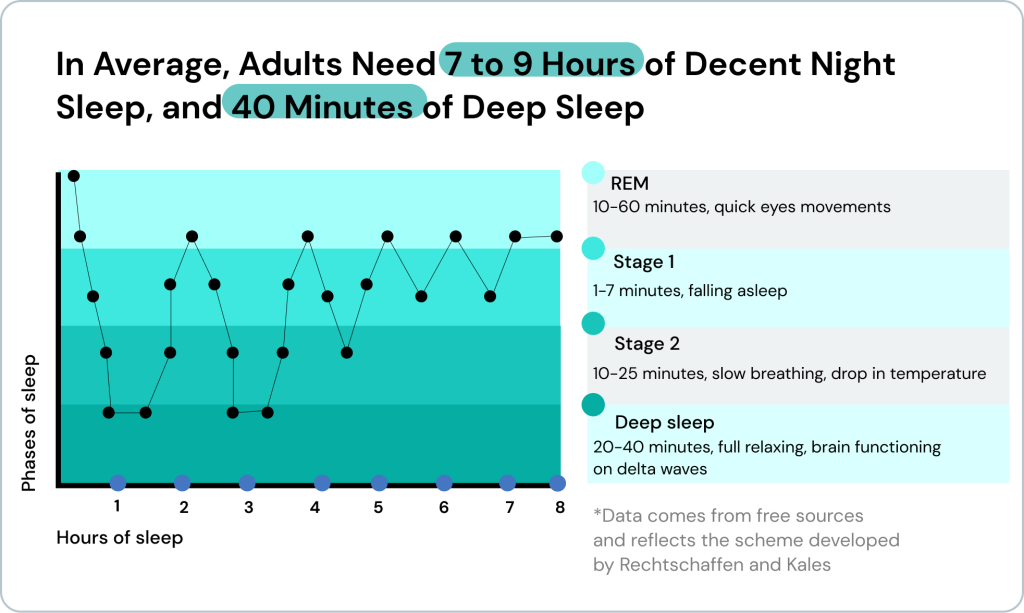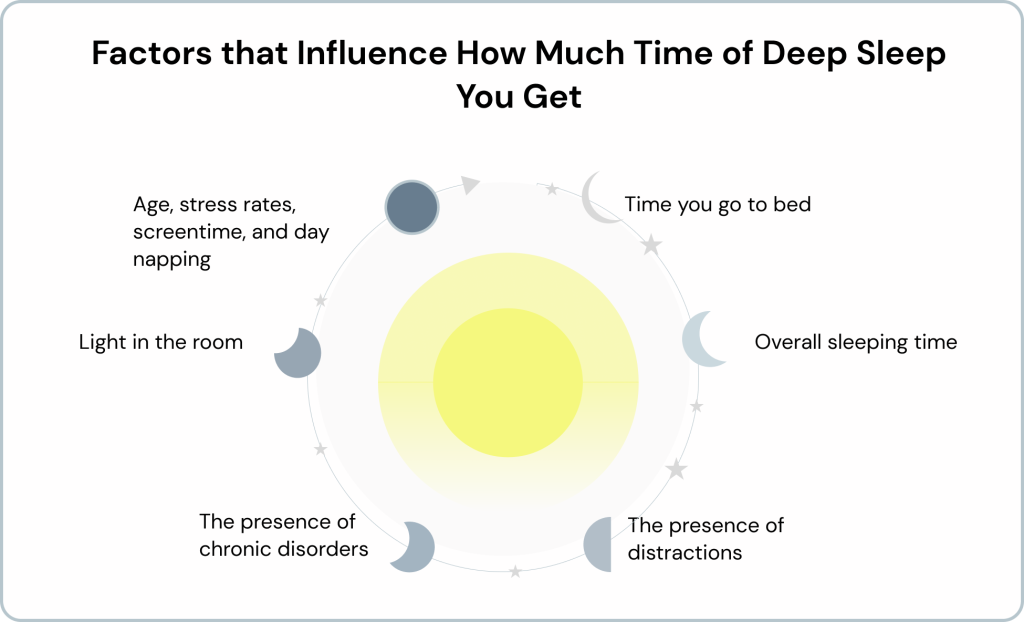It’s the zombie apocalypse! Everyone around you is walking in a daze, their lifeless eyes peering out above dark, sunken eye sockets. From their mouths, slight moans of forlorn agony. Are we describing the latest horror film to hit the box office? No, it’s merely a creative description of sleep deprivation in college students. Research finds that 41.2% of learners struggle with depression and 15.8% with ADHD. Another serious problem, sometimes stemming from these two conditions, is insomnia.
“Good sleep is a basis for effective… well, effective everything in your life.”
Akari Saito, a marketing student in New York
On average, 26.4 percent of students experience insomnia. That’s a mini zombie apocalypse, at least from the perspective of the sleepless. So, in this article, we talk about sleep deprivation and what happens when a person is not getting enough sleep. We’ve also included practical tips for dealing with insomnia in college students.
Is There a Specific Term for My Poor Sleeping? Yes. Sleep Deprivation.
Sleep deprivation means not sleeping well enough or long enough to get your body and mind restored for sufficient functioning during the day. It can happen because of too much caffeine, being exposed to blue screen light before going to bed, or because of a bad mattress, among other things.
However, there are also more severe issues connected with poor sleeping patterns. Some of these are listed by the National Sleep Foundation. They can various disorders like sleep apnea, insomnia, excessive spelling, or narcolepsy. These are severe conditions that require constant medical assistance.
As for the students’ sleep, although sleep deprivation is not a clinical condition, it also requires attention. Good sleep is a basis for effective… well, effective everything in your life.
Distinct Signs that You Need to Care More about Your Sleep Habits
If you missed a few hours of sleep this week because you visited a cool party, prepared for your exam, or just went stargazing, that’s fine. You will be a sleepy student for a day or two after this, but you’ll manage. However, if the lack of sleep is your constant condition or “normal state,” that is a sign that you may need to make some changes to your sleeping patterns.
- Excessive daytime sleepiness. Examples: You are sleepy and drop out of reality all the time. You cannot properly stay awake even while doing a pleasurable activity. You occasionally fall asleep during lectures and don’t remember how it happened.
- You wake up tired. Examples: No matter how long you sleep, you still wake up drained. Your sleep is inconsistent, or you wake up a lot during the night.
- You cannot fall asleep regularly. Examples: Your “normal” time for falling asleep is well after midnight. You cannot fall asleep properly and quickly, even if you are tired or haven’t slept properly. Your body badly needs a solid sleep but seems incapable of doing it.
- Decreased performance and increased error rate. Examples: Your grades are dropping – even though you put the same amount of effort and time into your studies. You make silly mistakes, even when you know the material well. You struggle to put a sentence together and sometimes you mean to say one thing but wind up saying something completely different.
- Physical Fatigue. Examples: You feel drained of energy during the day, and your brain is foggy and unfocused. The words do not seem to make sense in the sentences, and each task feels blurred and somehow draining.
- Mood swings and compromised immune system. Examples: Both your physical and mental health are out of whack. You start struggling with your digestive system, lose your appetite, and become overly reactive to minor triggers. Everything around is bad, including you (from your perspective). Your immune system acts funny: you start catching colds here and there, even in the middle of the summer.
“Good sleep helps your body restore energy and manage all the information that comes into your mind during the day. That is why decent sleep is essential for your concentration, memory, and general brain functioning.”
Jean Chavez, a first-year nursing student in New York
Effects of Sleep Deprivation on College Students
As said before, a short-term lack of sleep is not something to worry about. You can experience some drawbacks from poor sleeping, but these are easily manageable. However, as for long-term issues related to students’ sleep, the consequences can be quite serious. Recent research associates sleep disorders with an “increased risk of hypertension, diabetes, obesity, depression, heart attack, and stroke.”
Here is how poor sleeping relates to all these conditions:
Increased risk of hypertension
The correlation between consistent poor sleeping and hypertension is bidirectional, meaning one factor directly influences the other. For instance, both factors have a close connection to circadian rhythms. The body regulates blood pressure depending on activity, time of the day, and the usage of resources. If you don’t sleep for a while, all physiological processes are disrupted. Constant insomnia thus directly affects your blood pressure and energy level.
Diabetes and obesity
Here, we should get familiar with a specific term called insulin resistance. Insulin resistance is a condition when cells in your body’s tissues do not absorb and metabolize insulin properly, resulting in low glucose levels in your blood. In this case, your pancreatic islets produce more insulin to cover the lack, and you also want to eat more food for the same reason. If not regulated, these swings can lead to the inverse situation with glucose, diabetes, and obesity.
Cardiovascular system issues
If the student sleeps less than 6 hours per day, it affects the body’s metabolic processes, hormonal production, and inflammation processes. All these are negative factors for your heart because the night is when your body is meant to recuperate from the day’s activities.
What Can I Do to Improve My Sleep in College?
- Restart the pattern. Most likely, you feel trapped in the repetitive circle of going to sleep late, getting poor grades, and then pulling all-nighters trying to improve the situation. Instead, first, dedicate yourself to fixing your sleep for a week. Choose a week when you are overloaded with exams and such. This week your sleep should be your only major concern.
- Regulate your sleep cycle. While we sleep, we go through 4 different phases, going from light sleep to deep sleep and back. The time when you fall asleep and the time when you wake up affects how much of each phase you are likely to get. According to Rechtschaffen and Kales’s research, you need about 40 minutes of deep N3 sleep phase.
- Manage your routine for going to sleep. Develop an evening routine. An evening routine is not just about reducing screen light and not eating before bed. Rather, take care of your mental hygiene. Consider your time before going to bed as the time when you can let go of anxiety, thoughts about work, thoughts about tomorrow’s problems, and banning everything else that distracts you from getting rest.
- Comfortable environment. If you have any spine issues, it is especially crucial to get good sleep. Consider investing in an orthopedic mattress and silk bed sheets. Good bedding prevents microorganisms and dust mites, thus guarding you from allergies and ensuring a pleasant sleep.
- Let more air into your room, even in the winter. National Sleep Foundation recommends 60 to 68 degrees Fahrenheit (15.6 to 20 degrees Celsius). A comfortable room temperature helps your body regulate its natural biorhythmic patterns and makes it easier to carry you to sleep.
Instead of the Conclusion
Good sleep in college is a starting point for achieving academic excellence, well-being, and overall mental health. You need about 7 to 8 hours of sleep daily to be healthy and productive. It also matters what time you fall asleep, as the body reacts to light changes in your environment. We hope you have a good day and sleep soundly through the night!





